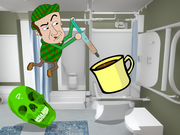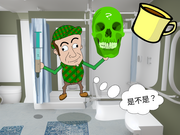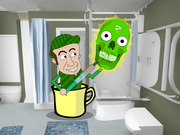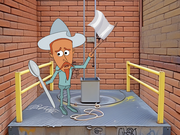to resemble / to be like / to look as if / such as / appearance / image / portrait / image under a mapping (math.)
像
=
亻
+
象
:
In anglepod's bathroom, Marie Curie and Rosa Luxemburg find a most delighting Elephant locomotive. They are so excited that they spontaneously start playing locomotive themselves, with Rosa grapping Marie's shoulders, and Marie exclaiming "choo choo" while pretending to pull a string, resembling the Elephant.
to be (followed by substantives only) / correct; right; true / (respectful acknowledgement of a command) very well / (adverb for emphatic assertion)
是
=
旦
+
龰
:
Mnemonic symbol: a skull, from "to be or not to be".
Sherlock Holmes (sh) starts his day in the space station's bathroom (Ø4) with a mug of coffee (旦). Holding a skull (mnemonic symbol for 是) in his hands, he asks himself "to be, or not to be" (是). He wonders if he can make the skull come back to life using lots of coffee, and injects coffee from his mug into the skull using a syringe (龰).
Sherlock Holmes (sh) starts his day in the space station's bathroom (Ø4) with a mug of coffee (旦). Holding a skull (mnemonic symbol for 是) in his hands, he asks himself "to be, or not to be" (是). He wonders if he can make the skull come back to life using lots of coffee, and injects coffee from his mug into the skull using a syringe (龰).
是
=
日
+
下
+
人
:
Mnemonic symbol: a skull, from "to be or not to be".
Sherlock Holmes (sh) watches the Neanderthal Man (人) trying to climb to the sun (日) on a ladder (下) in the space station's bathroom (Ø4). Sherlock is afraid that he'll open the window, so he puts on a big skull (是) and scares him off.
Sherlock Holmes (sh) watches the Neanderthal Man (人) trying to climb to the sun (日) on a ladder (下) in the space station's bathroom (Ø4). Sherlock is afraid that he'll open the window, so he puts on a big skull (是) and scares him off.
quilt / by / (indicates passive-voice clauses) / (literary) to cover / to meet with / (coll.) (since c. 2009) used before a verb that does not accurately represent what actually happened, to describe with black humor how sb or sth was dealt with by the authorities (as in 被自殺|被自杀[bei4 zi4 sha1])
(completed action marker) / (modal particle indicating change of state, situation now) / (modal particle intensifying preceding clause)
to finish / to achieve / variant of 瞭|了[liao3] / to understand clearly
了
=
乛
+
亅
:
Mnemonic symbol from "to finish" and the shape of the character: a prize cup.
Li Qingzhao (li) is responsible for manufacturing a prize cup (了). She only needs to add a poetic engraving. Unfortunately, she suffers from a writer's block. In the aorta's living room (ao3), someone left a cryptic message engraved on the walls using a sickle (乛), which is still lying on the floor. Being an accomplished poet Li Qingzhao is able to understand the message clearly (了), realizes its poetic potential and starts to engrave it on the prize cup using a crowbar (亅).
Li Qingzhao (li) is responsible for manufacturing a prize cup (了). She only needs to add a poetic engraving. Unfortunately, she suffers from a writer's block. In the aorta's living room (ao3), someone left a cryptic message engraved on the walls using a sickle (乛), which is still lying on the floor. Being an accomplished poet Li Qingzhao is able to understand the message clearly (了), realizes its poetic potential and starts to engrave it on the prize cup using a crowbar (亅).
of; ~'s (possessive particle) / (used after an attribute) / (used to form a nominal expression) / (used at the end of a declarative sentence for emphasis) / also pr. [di4] or [di5] in poetry and songs







